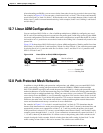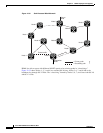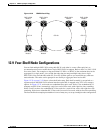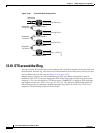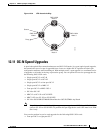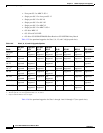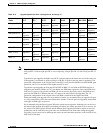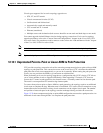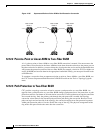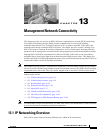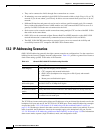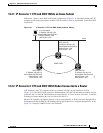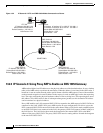
12-39
Cisco ONS 15454 Reference Manual, R8.5.x
78-18106-01
Chapter 12 SONET Topologies and Upgrades
12.12.1 Unprotected Point-to-Point or Linear ADM to Path Protection
Circuit types supported for in-service topology upgrades are:
• STS, VT, and VT tunnels
• Virtual concatenated circuits (VCAT)
• Unidirectional and bidirectional
• Automatically routed and manually routed
• CTC-created and TL1-created
• Ethernet (unstitched)
• Multiple source and destination (both sources should be on one node and both drops on one node)
You cannot upgrade stitched Ethernet circuits during topology conversions. For in-service topology
upgrade procedures, refer to the “Convert Network Configurations” chapter in the Cisco ONS 15454
Procedure Guide. For procedures to add or remove a node, refer to the “Add and Remove Nodes” chapter
of the Cisco ONS 15454 Procedure Guide.
Note A database restore on all nodes in a topology returns converted circuits to their original topology.
Note Open-ended path protection and DRI configurations do not support in-service topology upgrades.
12.12.1 Unprotected Point-to-Point or Linear ADM to Path Protection
CTC provides a topology conversion wizard for converting an unprotected point-to-point or linear ADM
topology to path protection. This conversion occurs at the circuit level. CTC calculates the additional
path protection circuit route automatically or you can do it manually. When routing the path protection
circuit, you can provision the USPR as go-and-return or unidirectional.
When performing an in-service topology upgrade on a configuration with VCAT circuits, CTC allows
you to select member circuits to upgrade individually. When upgrading VT tunnels, CTC does not
convert the VT tunnel to path protection, but instead creates a secondary tunnel for the alternate path.
The result is two unprotected VT tunnels using alternate paths.
To convert from point-to-point or linear ADM to a path protection, the topology requires an additional
circuit route to complete the ring. When the route is established, CTC creates circuit connections on any
intermediate nodes and modifies existing circuit connections on the original circuit path. The number
and position of network spans in the topology remains unchanged during and after the conversion.
Figure 12-35 shows an unprotected point-to-point ADM configuration converted to a path protection. An
additional circuit routes through Node 3 to complete the path protection.



